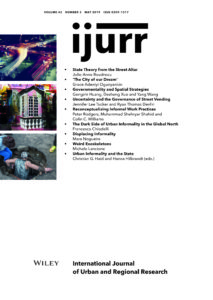Whilst paid informal work has been conceptualized as a form of paid employment imbued with solely economic motivations, this article critically argues that such a market‐oriented reading fails to take into account alternative explanations for the existence of informal work practices. Using evidence from 50 interviews conducted within a Pakistani urban community in a northern UK city, this article, uses a mixed‐embeddedness perspective to highlight the importance of predominantly socially and culturally driven motives in the decision to engage in informal work. The findings highlight that participation in informal work, whilst a product of marginalization due to certain institutional and structural factors, is also driven by a range of non‐monetary motives—a result of certain socially embedded work relations between ethnic minority workers and their employers. It is this social embeddedness of the employer–employee relationship in the Pakistani ethnic minority community that explains the continuation of informal work practices in the face of prevailing laws and regulations. The findings add weight to the understanding of informal work as being about more than just economics and constraints, offering these ethnic minority workers opportunities, even status, and giving them agency in an otherwise disempowered situation.
Details
Written by:
Peter Rodgers, Muhammad Shehryar Shahid & Colin C. Williams
Digital Object Identifier (DOI)
10.1111/1468-2427.12774
About DOI

